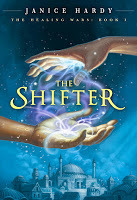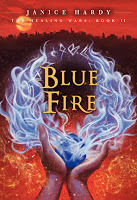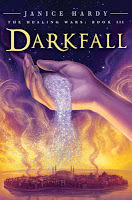Blog Takeover: Janice Hardy On Style

I'm swapping blogs today with the oh-so-awesome Janice Hardy, author of the imaginative Healing Wars Trilogy & Writing Mastermind of The Other Side Of The Story. Janice is one of the most knowledgeable writers I know, and her MG series is among my favorites. It's a pleasure to hand her the keys and duck out...if you like, after you finishing reading her wisdom today, maybe you'll follow me to Janice's secret lair where I divulge (are you ready for this?) The Key To Success. And now over to Janice...
Are You Just Making Lists? Smoothing the Flow of Your Prose
One pitfall of a first person point of view is that you sometimes end up with a lot of sentences in a row starting with I. This holds true for third person as well, but it seems a bit more noticeable in first. (Maybe because it makes the narrator feel self-centered and egotistical). But the "list-like paragraph" can occur in a variety of ways, and they all have the same result.
A monotonous rhythm that puts readers to sleep.
Good writing has a musical flow, drawing the reader into and through the paragraph and seamlessly handing them off to the next paragraph. Without that flow, you get this:
I ran down to the river to look for my little brother. I found him sitting on a rock, his feet dangling in the water. I yelled for him to come home, but he didn't seem to hear me. I went over and nudged him in the arm. He screamed and fell off the rock into the river. I just laughed.
-Yawn-
The same rhythm, the same pace. The sentences are all roughly the same length as well, adding to that list-like feel. Before you think, "Well, that's just how first person is," let's look at it in third.
 Fred ran down to the river to look for his little brother. He found him sitting on a rock, his feet dangling in the water. Fred yelled for him to come home, but he didn't seem to hear him. Fred went over and nudged him in the arm. He screamed and fell off the rock into the river. Fred just laughed.
Fred ran down to the river to look for his little brother. He found him sitting on a rock, his feet dangling in the water. Fred yelled for him to come home, but he didn't seem to hear him. Fred went over and nudged him in the arm. He screamed and fell off the rock into the river. Fred just laughed.It's just as bad, isn't it? And with both characters being male, you can't even use pronouns all the time to avoid repeating the name.
A little variety makes all the difference. Instead of just using description of action, try mixing in a little internalization, setting, mood, dialog, and reorganizing the sentence structures.
Where was that kid? Fred ran down to the river, scanning the bank where Georgie liked to play. A flash of a red Elmo t-shirt caught his eye and he veered toward it.
"Georgie! Time for dinner."
Georgie didn't turn around; just sat on his rock, head down, his feet dangling in the water.
I can't believe he's gonna make me go down there. Fred slogged through weeds and mud, messing up his brand new sneakers, and nudged Georgie in the arm.
He spun around, screaming, and toppled right off the rock and into the river.
Fred laughed. "Serves you right, brat."
 A much more interesting scene now, using the same elements as the original paragraph. Now it's more than a list of actions.
A much more interesting scene now, using the same elements as the original paragraph. Now it's more than a list of actions. But pronouns aren't the only culprits to list-like prose. Similar sentence structure can also give your prose a list feel.
Six men ran across the yard, carrying automatic weapons. They moved silently, their feet light against the stones. At the gate they stopped, waiting on high alert. Their leader disengaged the panel, shutting off the alarm.
Or even...
Six men ran across the yard and ducked behind the wall. They moved silently and their feet made little sound against the stones. At the gate they stopped and waited on high alert. Their leader disengaged the panel and shut off the alarm.
Or another common one...
Carrying automatic weapons, six men ran across the yard. Moving silently, their feet were light against the stones. Still on alert, they stopped at the gate and waited. Carefully, their leader disengaged the panel and shut off the alarm.
See how the same sentence structure flattens out the rhythm?
Red Flags for List-Like Prose
Your ear is probably the best detector on this, especially if you read the work out loud. If it sounds like a list, it probably is.
 Multiple sentences all starting with pronouns, or all the same pronoun: I-I-I he-he-he, I-he-I-she, it-it-it. One trick here is to do a find and replace for "punctuation, space, pronoun" (. I ? He) and make them bold and red. Several in a row will stand out.
Multiple sentences all starting with pronouns, or all the same pronoun: I-I-I he-he-he, I-he-I-she, it-it-it. One trick here is to do a find and replace for "punctuation, space, pronoun" (. I ? He) and make them bold and red. Several in a row will stand out. Sentences of the same size and structure: These are harder to find, and you really do have to trust your ear on them. But even if they don't all start with a pronoun, sentences with the same structure sound just as list-like. We did this, we did that. He did something and then did something else. To start, they all did something.
You skim it when you read it: If you find yourself skimming over a paragraph because you know what happens and all it does is relay that, there's a decent chance you're just listing the events. Your instincts are probably telling you it's not worth reading, so you don't.
Testing List-Like Prose
Another trick to test if a paragraph is sounding too monotonous, is to actually make a list with the sentences.
Fred ran down to the river to look for his little brother. He found him sitting on a rock, his feet dangling in the water. Fred yelled for him to come home, but he didn't seem to hear him. Fred went over and nudged him in the arm. He screamed and fell off the rock into the river. Fred just laughed.
Reads more like an outline than prose in this format. This also works for similar structure.
This is one of those things that once you're aware of what it sounds like, you'll quickly develop an ear for it and be able to avoid it in your own work. Trust your instincts. If it sounds like a list, it's probably a list.
 Janice's Q for you: Do you check for sentence variety during revisions or does it come naturally as you write?
Janice's Q for you: Do you check for sentence variety during revisions or does it come naturally as you write? Janice Hardy always wondered about the darker side of healing. For her fantasy trilogy THE HEALING WARS, she tapped into her own dark side to create a world where healing was dangerous, and those with the best intentions often made the worst choices. Her books include THE SHIFTER, BLUE FIRE, and DARKFALL. She lives in Georgia with her husband, three cats and one very nervous freshwater eel. You can visit her online at www.janicehardy.com, chat with her about writing on her blog, The Other Side of the Story or find her on Twitter @Janice_Hardy.

Published on June 21, 2012 03:21
No comments have been added yet.
Writers Helping Writers
A place for writers to find support, helpful articles on writing craft, and an array of unique (and free!) writing tools you can't find elsewhere. We are known far and wide for our "Descriptive Thesau
A place for writers to find support, helpful articles on writing craft, and an array of unique (and free!) writing tools you can't find elsewhere. We are known far and wide for our "Descriptive Thesaurus Collections" which help authors create vivid imagery and sensory detail for their Settings, Characters (physical descriptions, emotions, skills & talents, etc.), Symbolism, Weather, and a whole bunch more. Stop in and say hello! :) http://writershelpingwriters.net/
...more
- Angela Ackerman's profile
- 1014 followers



